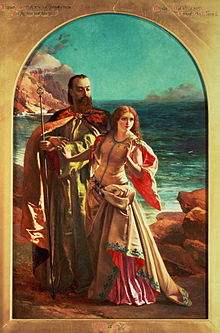
From one of the most common Roman praenomen, its origin and meaning is uncertain. A popular etymology is that it relates to Mars, others suggest it may be from the Etruscan Marce, which may come from mar (to harvest). It is said the name was originally bestowed on those who were born in March.
Marcellus and the name of the month of March likely shares the same etymological root.
It was borne by several notable Romans, including Mark Antony, Marcus Aurelius & Cicero.
It was the name of one of the Evangelists who authored the eponymous Gospel, known as St. Mark in the Christian world, he is revered as the founder of Christianity in Africa and is traditionally believed to have founded the Church in Alexandria. Coptic Christians hold him in high regard. His bones were smuggled out of Egypt in a barrel of pork fat by Venetian merchants from Alexandria when Egypt fell under Islamic rule and were transported back to Venice where they were eventually installed and dedicated in the Basilica of San Marco.
The name was borne by a 2nd-century pope as well.
Marcus, Mark and Marc have been quite popular in several countries. Marcus was in the U.S. Top 100 between 1970-2000, Sweden’s between 1998-2008, New Zealand’s between 2008-2014, England & Wales between 1996-2003, and in Denmark’s between 1994-2006. Currently, his rankings in other countries are as follows:
- #54 (Canada, BC, 2018)
- #87 (Australia, 2018)
- #100 (Norway, 2018)
- #209 (United States, 2018)
- #213 (France, 2018)
- #236 (England & Wales, 2018)
- #406 (Netherlands, 2018)
Its latinate form of Marco, which started off as a mainly Italian form, became widespread across the continent. His rankings in the following countries are as follows:
- #11 (Galicia, Spain, 2018)
- #16 (Spain, 2018_
- #23 (Italy, 2018)
- #65 (Catalonia, Spain, 2018)
- #81 (Portugal, 2018)
- #358 (United States, 2018)
- #436 (England & Wales, 2018)
- #446 (France, 2018)
It’s English form of Mark appears in the legend of Tristan & Isolde as the name of the King of Cornwall, supposedly the name was not common in the English-speaking world until the 19th-century, but became a hit by the Mid-1900s. Mark appeared in the U.S. Top 100 between 1944-2002, which is quite a long stretch. Mark peaked the highest in popularity between 1955-1970, peaking at #6, six years in a row between 1959-1964. Marks’s rankings in other countries are as follows:
- #5 (Slovenia, 2018)
- #6 (Moscow, Russia, 2018)
- #21 (Hungary, 2018)
- #83 (Ireland, 2018)
- #210 (U.S., 2018)
- #253 (England & Wales, 2018)
- #298 (the Netherlands, 2018)
Marc is the French, Catalan & Welsh form and has been popularly used in the English-speaking world, it is currently the most popular male name in Catalonia, 2018 and between 1968-1976 it was in the U.S. Top 100. Marc’s rankings in the popularity charts are as follows
- #26 (Spain, 2018)
- #313 (France, 2018)
- #825 (US, 2018)
Other forms of the name include:
- Mark Марк (Albanian, Belarusian, Breton, Dutch, English, Maltese, Russian, Ukrainian)
- Marḳos ማርቆስ (Amharic)
- Marqus مَرْقُس (Arabic, mainly used among Arab-Christians)
- Marghos (Armenian)
- Marko (Basque)
- Marko Марко (Bosnian, Bulgarian, Croatian, Finnish, Macedonian, Serbian, Slovene, Ukrainian)
- Markos Μαρκος Ⲙⲁⲣⲕⲟⲥ (Coptic, Greek)
- Margh (Cornish)
- Marcu (Corsican, Romanian)
- Mokus (Croatian, Serbian)
- Marek (Czech, Polish, Slovak)
- Marco (Catalan, Dutch, Galician, German, Italian, Portuguese, Spanish)
- Marc (Catalan, French, Occitanian, Welsh)
- Marcus (Dutch, English, German, French, Scandinavian)
- Markus (Dutch, Estonian, Faroese, Finnish, Frisian, German, Scandinavian)
- Marghus (Estonian)
- Markko, Markku (Finnish)
- Marke (Finnish)
- Marcas (Gaelic)
- Marx (German, archaic)
- Maleko (Hawaiian)
- Márk (Hungarian)
- Markús (Icelandic)
- Marchino (Italian)
- Marcolino (Italian)
- Marcuccio (Italian)
- Mareks (Latvian)
- Marks (Latvian)
- Markuss (Latvian)
- Markas, Morkus (Lithuanian)
- March (Lombard)
- Markys (Manx)
- Marquét (Poitvin, diminutive form)
- Marcos (Portuguese, Spanish)
- Kusi (Swiss-German diminutive form)
- Marqōs ܡܪܩܘܣ (Syriac)
- Mår (Walloon)
It’s feminine forms include Marca but and sometimes Marcia was used as a feminine form, though it is more the feminine equivalent of Marcius.
Other feminine forms include:
- Markusine (German, obscure)
- Marchina (Italian)
- Marcolina (Italian)
- Marcuccia (Italian)
Sources










 Its feminine form of Rufina was borne by a couple of early saints, one of whom was from Seville, she was a pottery maker who refused to sell her wares for a pagan festival.
Its feminine form of Rufina was borne by a couple of early saints, one of whom was from Seville, she was a pottery maker who refused to sell her wares for a pagan festival.